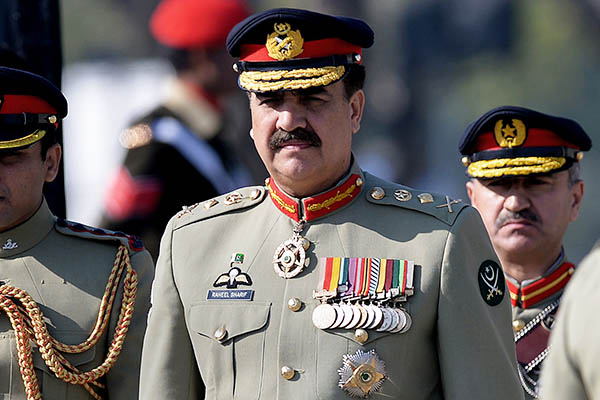
Aamir Qureshi—AFP
Gen. Raheel Sharif says extremist group has potential to become a much greater threat than Al Qaeda.
Pakistan Army chief General Raheel Sharif has said that his country would not allow “even a shadow” of Islamic State and termed the group a greater threat than Al Qaeda.
“As far as Daesh is concerned, in Pakistan, even a shadow of Daesh would not be allowed,” Sharif said in an address to The Royal United Services Institute for Defense and Security Studies in London on Friday.
In May, the Islamic State militant group claimed the killings of at least 43 members of the Shia Ismaili minority in Karachi. Leaflets backing I.S. jihadists have been seen recently in parts of northwest Pakistan and pro-I.S. slogans have appeared on walls in several cities.
“There are people in Islamabad who want to show their allegiance to Daesh. So it’s a very dangerous phenomenon,” Sharif said. He said dealing with the extremist group was set to become an even greater challenge than the Al Qaeda network behind 9/11 attacks in the United States.
“I feel the future challenge is Daesh. It’s a bigger name. Al Qaeda was a name but Daesh is now a bigger name,” Sharif said.
The general, popular for taking on militants from the tribal areas bordering Afghanistan to criminal gangs in Karachi, emphasized the reconciliation between Afghan Taliban and the Afghan government. He expressed his fear the Taliban could seek an alliance with Daesh unless they were brought back to the negotiating table.
“This reconciliation in Afghanistan is very important. If we do not do it in the proper manner and the Afghan Taliban splinter, they would go for a bigger name and that is Daesh,” Sharif said.
Pakistan, which supported the Taliban during the 1990s, has blown hot and cold over the insurgency while contending it was working to bring about Afghan reconciliation. Islamabad organized the first set of direct peace talks between the Taliban and the Afghan government in July. But another round scheduled around later that month was stalled following the announcement of the death of Taliban founder Mullah Omar.
General Sharif launched operation Zarb-e-Azb in June 2014 in a bid to wipe out militant bases in North Waziristan and bring an end to the bloody decade-long Islamist insurgency that has cost Pakistan thousands of lives. The Army intensified its offensive after last year’s Peshawar school attack, which killed 151 since when there has been a lull in violence. The last major attack in the city came in February when three heavily armed Taliban militants stormed a Shia mosque, killing 21 people.
Overall levels of violence have dropped dramatically this year, with 2015 on course for the fewest deaths among civilian and security forces since 2007—the year the Pakistani Taliban umbrella group was formed.
